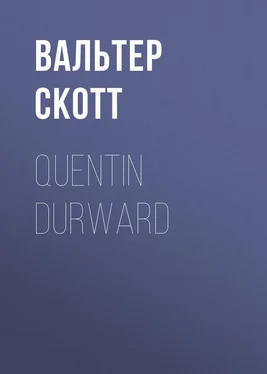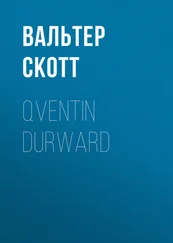Вальтер Скотт - Quentin Durward
Здесь есть возможность читать онлайн «Вальтер Скотт - Quentin Durward» — ознакомительный отрывок электронной книги совершенно бесплатно, а после прочтения отрывка купить полную версию. В некоторых случаях можно слушать аудио, скачать через торрент в формате fb2 и присутствует краткое содержание. Жанр: foreign_antique, foreign_prose, Альтернативная история, на английском языке. Описание произведения, (предисловие) а так же отзывы посетителей доступны на портале библиотеки ЛибКат.
- Название:Quentin Durward
- Автор:
- Жанр:
- Год:неизвестен
- ISBN:нет данных
- Рейтинг книги:3 / 5. Голосов: 1
-
Избранное:Добавить в избранное
- Отзывы:
-
Ваша оценка:
- 60
- 1
- 2
- 3
- 4
- 5
Quentin Durward: краткое содержание, описание и аннотация
Предлагаем к чтению аннотацию, описание, краткое содержание или предисловие (зависит от того, что написал сам автор книги «Quentin Durward»). Если вы не нашли необходимую информацию о книге — напишите в комментариях, мы постараемся отыскать её.
Quentin Durward — читать онлайн ознакомительный отрывок
Ниже представлен текст книги, разбитый по страницам. Система сохранения места последней прочитанной страницы, позволяет с удобством читать онлайн бесплатно книгу «Quentin Durward», без необходимости каждый раз заново искать на чём Вы остановились. Поставьте закладку, и сможете в любой момент перейти на страницу, на которой закончили чтение.
Интервал:
Закладка:
The young man, on hearing himself thus reproved by a man of advanced age and respectable appearance, immediately lowered his weapon, and said he would be sorry if he had done them injustice; but, in reality, it appeared to him as if they had suffered him to put his life in peril for want of a word of timely warning, which could be the part neither of honest men nor of good Christians, far less of respectable burgesses, such as they seemed to be.
“Fair son,” said the elder person, “you seem, from your accent and complexion, a stranger; and you should recollect your dialect is not so easily comprehended by us; as perhaps it may be uttered by you.”
“Well, father,” answered the youth, “I do not care much about the ducking I have had, and I will readily forgive your being partly the cause, provided you will direct me to some place where I can have my clothes dried; for it is my only suit, and I must keep it somewhat decent.”
“For whom do you take us, fair son?” said the elder stranger, in answer to this question.
“For substantial burgesses, unquestionably,” said the youth; “or – hold; you, master, may be a money broker, or a corn merchant; and this man a butcher, or grazier.”
“You have hit our capacities rarely,” said the elder, smiling. “My business is indeed to trade in as much money as I can and my gossip’s dealings are somewhat of kin to the butcher’s. As to your accommodation we will try to serve you; but I must first know who you are, and whither you are going, for, in these times, the roads are filled with travellers on foot and horseback, who have anything in their head but honesty and the fear of God.”
The young man cast another keen and penetrating glance on him who spoke, and on his silent companion, as if doubtful whether they, on their part, merited the confidence they demanded; and the result of his observation was as follows.
The eldest and most remarkable of these men in dress and appearance, resembled the merchant or shopkeeper of the period. His jerkin, hose, and cloak were of a dark uniform colour, but worn so threadbare that the acute young Scot conceived that the wearer must be either very rich or very poor, probably the former. The fashion of the dress was close and short, a kind of garment which was not then held decorous among gentry, or even the superior class of citizens, who generally wore loose gowns which descended below the middle of the leg.
The expression of this man’s countenance was partly attractive and partly forbidding. His strong features, sunk cheeks, and hollow eyes had, nevertheless, an expression of shrewdness and humour congenial to the character of the young adventurer. But then, those same sunken eyes, from under the shroud of thick black eyebrows, had something in them that was at once commanding and sinister. Perhaps this effect was increased by the low fur cap, much depressed on the forehead, and adding to the shade from under which those eyes peered out; but it is certain that the young stranger had some difficulty to reconcile his looks with the meanness of his appearance in other respects. His cap, in particular, in which all men of any quality displayed either a brooch of gold or of silver, was ornamented with a paltry image of the Virgin, in lead, such as the poorer sort of pilgrims bring from Loretto [a city in Italy, containing the sanctuary of the Virgin Mary called the Santa Casa, reputed to have been brought there by angels.].
His comrade was a stout formed, middle sized man, more than ten years younger than his companion, with a down looking visage and a very ominous smile, when by chance he gave way to that impulse, which was never, except in reply to certain secret signs that seemed to pass between him and the elder stranger. This man was armed with a sword and dagger; and underneath his plain habit the Scotsman observed that he concealed a jazeran, or flexible shirt of linked mail, which, as being often worn by those, even of peaceful professions, who were called upon at that perilous period to be frequently abroad, confirmed the young man in his conjecture that the wearer was by profession a butcher, grazier, or something of that description, called upon to be much abroad. The young stranger, comprehending in one glance the result of the observation which has taken us some time to express, answered, after a moment’s pause, “I am ignorant whom I may have the honour to address,” making a slight reverence at the same time, “but I am indifferent who knows that I am a cadet of Scotland; and that I come to seek my fortune in France, or elsewhere, after the custom of my countrymen.”
“Pasques dieu! and a gallant custom it is,” said the elder stranger. “You seem a fine young springald, and at the right age to prosper, whether among men or women. What say you? I am a merchant, and want a lad to assist in my traffic; I suppose you are too much a gentleman to assist in such mechanical drudgery?”
“Fair sir,” said the youth, “if your offer be seriously made – of which I have my doubts – I am bound to thank you for it, and I thank you accordingly; but I fear I should be altogether unfit for your service.”
“What!” said the senior, “I warrant thou knowest better how to draw the bow, than how to draw a bill of charges – canst handle a broadsword better than a pen – ha!”
“I am, master,” answered the young Scot, “a braeman, and therefore, as we say, a bowman. But besides that, I have been in a convent, where the good fathers taught me to read and write, and even to cipher.”
“Pasques dieu! that is too magnificent,” said the merchant. “By our Lady of Embrun [a town in France containing a cathedral in which was a wooden statue of the Virgin Mary, said to have been sculptured by St. Luke], thou art a prodigy, man!”
“Rest you merry, fair master,” said the youth, who was not much pleased with his new acquaintance’s jocularity, “I must go dry myself, instead of standing dripping here, answering questions.”
The merchant only laughed louder as he spoke, and answered, “Pasques dieu! the proverb never fails – fier comme un Ecossois [proud or haughty as a Scotchman] – but come, youngster, you are of a country I have a regard for, having traded in Scotland in my time – an honest poor set of folks they are; and, if you will come with us to the village, I will bestow on you a cup of burnt sack and a warm breakfast, to atone for your drenching. – But tete bleau! what do you with a hunting glove on your hand? Know you not there is no hawking permitted in a royal chase?”
“I was taught that lesson,” answered the youth, “by a rascally forester of the Duke of Burgundy. I did but fly the falcon I had brought with me from Scotland, and that I reckoned on for bringing me into some note, at a heron near Peronne, and the rascally schelm [rogue, rascal (obsolete or Scotch)] shot my bird with an arrow.”
“What did you do?” said the merchant.
“Beat him,” said the youngster, brandishing his staff, “as near to death as one Christian man should belabour another – I wanted not to have his blood to answer for.”
“Know you,” said the burgess, “that had you fallen into the Duke of Burgundy’s hands, he would have hung you up like a chestnut?”
“Ay, I am told he is as prompt as the King of France for that sort of work. But, as this happened near Peronne, I made a leap over the frontiers, and laughed at him. If he had not been so hasty, I might, perhaps, have taken service with him.”
“He will have a heavy miss of such a paladin as you are, if the truce should break off,” said the merchant, and threw a look at his own companion, who answered him with one of the downcast lowering smiles which gleamed along his countenance, enlivening it as a passing meteor enlivens a winter sky.
Читать дальшеИнтервал:
Закладка:
Похожие книги на «Quentin Durward»
Представляем Вашему вниманию похожие книги на «Quentin Durward» списком для выбора. Мы отобрали схожую по названию и смыслу литературу в надежде предоставить читателям больше вариантов отыскать новые, интересные, ещё непрочитанные произведения.
Обсуждение, отзывы о книге «Quentin Durward» и просто собственные мнения читателей. Оставьте ваши комментарии, напишите, что Вы думаете о произведении, его смысле или главных героях. Укажите что конкретно понравилось, а что нет, и почему Вы так считаете.












